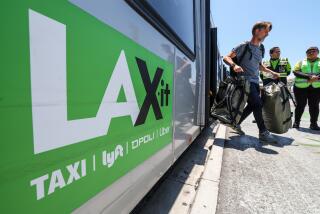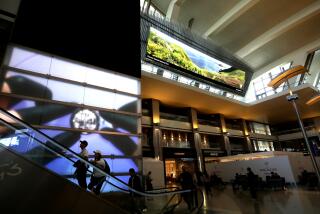LAXâs controversial full-body scanners out; new, faster scanners in
At LAX and other major airports, the Transportation Security Administration is replacing full-body scanners that have been criticized for creating potential health risks and privacy violations with a type of scanner that has not been condemned as harshly.
The TSA said Monday that the move is intended to relocate faster scanners to busier airports.
The TSA operates more than 700 body scanners at about 180 airports across the country. The machines were introduced at the nationâs airports after Umar Farouk Abdulmutallab tried to blow up a U.S. airliner near Detroit with explosives hidden in his underwear on Christmas Day 2009.
VIDEO: Airline seats are getting tighter
About half of those scanners employ âbackscatterâ technology that uses low-level X-rays to create what resembles a nude image of passengers to detect weapons. The faster scanners use low-level radio waves, or millimeter waves, and instead use a generic avatar figure to show hidden objects.
The backscatter machines have been criticized by academics and privacy advocates who say the radiation they emit poses a health risk and the images they create violate the privacy of passengers.
TSA officials say the millimeter wave machines are being moved into high-traffic airports like Los Angeles International because they can screen each passenger in about 10 seconds. The backscatter scanner can take up to a minute.
Torrance-based Rapiscan Systems Inc., the makers of the backscatter machines, declined to comment Monday.
Brandon Macsata, executive director of the Assn. for Airline Passenger Rights, said he doesnât believe the TSAâs reason for switching out the machines.
âItâs hard to believe what they say,â he said, citing previous TSA statements about the privacy of the scanners that Macsata said have been false.
Marc Rotenberg, executive director of the Electronic Privacy Information Center, a nonprofit privacy research group, said he believes the TSA is making the switch âto respond to unending public criticism.â
âI think the TSA is trying to make the best of a bad situation,â he said.
More to Read
Inside the business of entertainment
The Wide Shot brings you news, analysis and insights on everything from streaming wars to production â and what it all means for the future.
You may occasionally receive promotional content from the Los Angeles Times.










